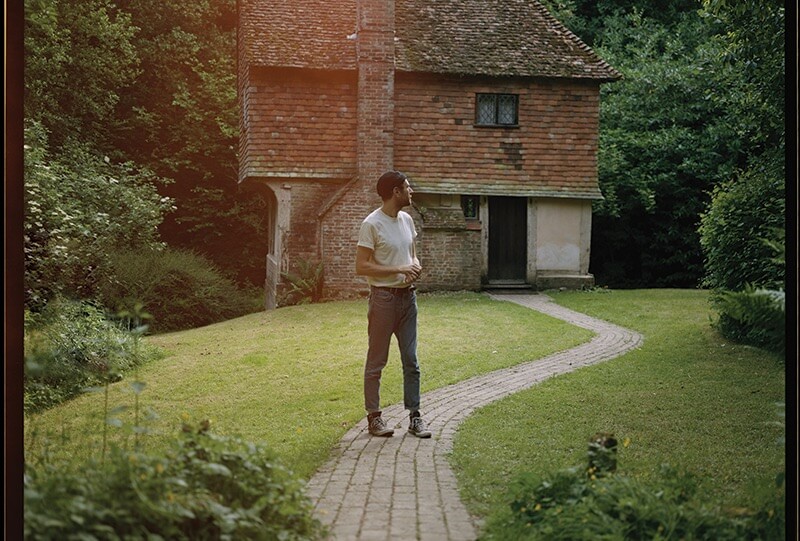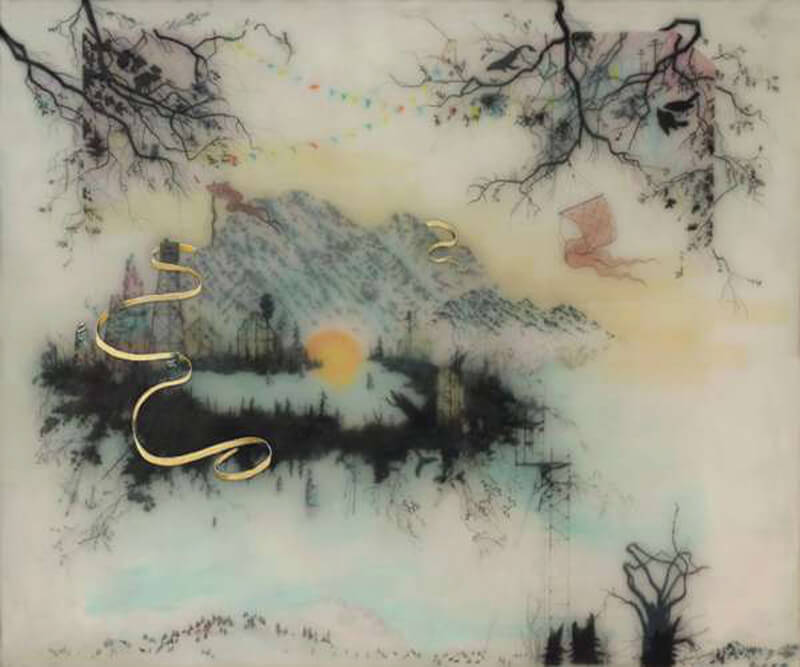After a summer spent at a summer camp in the woods in upstate New York, young Ali Lacey was forever changed and the music of Novo Amor (his alter ego) soon followed. Returning home to Wales and facing a period of uncertainty, Lacey discovered that there were matters that were pressing on him to put to lyrics and consequently found his voice through the Novo Amor moniker. With a foundation in music production, he was able to create music with a level of professionalism not found in many young artists just starting out. We caught up with Lacey to talk about his journey as a musician and the onset of what is, Novo Amor.
Do you come from a musical family; what were some of your early influences?
Yeah, I guess I’m from a musical background, not necessarily a musical family apart from my dad and my brother. My dad used to have kind of a studio next to our house that he was trying to run, but didn’t really get very far, so it was full of drum kits and guitars. And I remember being five-years-old and just hitting drums and tuning guitars and breaking sticks and stuff. But you know, I didn’t really think about music for years and years, and it was about nine or ten when I got really into skateboarding and music seemed to go hand in hand with that, with all the music you hear on the skate tapes. And I just fell in love with a lot of rock and punk music and ended up wanting to be in a band because of it. I joined bands at the age of thirteen playing drums… and playing with my dad and my brother, as well.
I was listening to things like Green Day’s early stuff, The Offspring, and AFI, slightly heavier bands.. I never really looked back since, and got really into music production.
It seems like there’s a strong storytelling component to the music you write. What does the songwriting process look like for you?
I mean, every song I guess you could say is some sort of journey. And yeah, a lot of people have said, all your songs seem to kind of be the same in that they start soft and then really build up in dynamics, and it’s kind of right, I guess. I think that’s maybe influenced from the rock music I used to listen to. I quite like heavy drums and distorted guitars. And yeah, I can hear it seeping through in a lot of my recordings.
The songwriting process… it varies. You know, I go through weeks of not writing anything I like and then maybe one day I write something that I think is good and then record it and… I won’t like it anymore and you go for months and months… the process is just sitting around writing whenever I want to, really. If I like something, I’ll start recording it properly. There are no real objectives, though, other than to make music I want to make, or if I want to talk about something I’ll write about it.

photo by Daniel Alexander Harris
So, it just comes when it comes, you don’t force it? Do you usually start with lyrics and build off of that, or the other way around?
I find it hard to start with lyrics because it’s hard to structure a song around just [words]. I prefer to just pick up a guitar, or be at the piano and kind of mumble melodies; once you have a melody then you can really start to fill the lyrics around that, so you’re not tied to what you want to say before you even start.
Can we talk a bit about how you met Ed Tullet, your longtime collaborator? What was the process like for you learning to collaborate with another musician for the first time and has that changed the way you approach songwriting now?
We met through a mutual friend who was supporting Ed’s UK tour back in 2013. He ended up needing somewhere to stay, so he ended up staying at [my place] for the weekend and just started writing, so we started making a record from the first weekend we met. Without really realizing it, it just came so easy.
Ed’s someone who I think is a really good songwriter and a really close friend of mine now, and I just like to have him around. Sometimes making your own music can be really boring and stressful and upsetting, so it’s nice to have another pair of ears and in that way, collaboration is good, really. I’ve been doing a bit more collaboration recently, and I’m going to have two more songs out with someone else, so that’s going to be exciting.
It sounds like your background in music production definitely has an influence on the strength of your songwriting today.
I think so, yeah, because I think I can hear how a song’s going to end up before having to commit it to an album or go to a big studio to record. I can kind of see, “Oh, I have this idea, I’m going to record it,” and if it’s not quite right then that’s fine, I can get rid of it or hopefully I have the skills to change it without having to rely on anyone else. So, learning how to produce was the best thing I’ve probably ever did… with my entire life, I guess.
Does the feeling of a song change quite a bit for you as you perform it more and more?
I think so, I mean the meaning of the songs, I don’t think that it matters for the live performance. Like, I’m not going to perform a song because it’s about a certain thing, really. It’s more about how I feel about the tracks now. For example, a lot of my earlier stuff I don’t think are that good of songwriting, or I don’t think will lend well to a live performance, I’ll maybe cut them out. Or some I do still play, only because I think they’ll work well in the set. I think the live performance is a completely separate thing to the album…So, it’s whatever works; I definitely get bored of certain things and I’m always trying to level up the live set with new ideas. That’s why I’ve got a live band of five of us, to keep it interesting.

album artwork for ‘Birthplace’
What is that like for you now, with the success that has come from your music so that you’re able to just solely focus on songwriting?
It’s kind of weird when your hobby becomes your job because you don’t find any free time, essentially. You feel like you’re always working because you’re always thinking about this thing that you love and are wanting to do. I aspired to be a producer or performer or artist for years and then it kind of happened. And it becomes a full-time thing because I was waking up in the morning and then working until whatever time at night, and then doing it over and over again, and it was kind of killing me slowly…kind of sucking the joy out of music in a way.
But I mean, it was all for a great in the end because I knew I was making an album and I knew I really did like what I was doing, it was just stressful to have the pressure to be making music and I think that’s why it is good to have collaborators because you don’t find yourself, you know, sat on the floor at 4:00 in the morning freaking out about whether a song is going to be as good as you thought it would be.
What was it like stepping into the spotlight, particularly your early days as a performer?
Seeing as I had a background in learning how to produce, I thought “Oh, I can really do this.” Without having to really be an artist, I’m just going to make some music and put it out. Then suddenly there was a demand for me to get on a stage and my first ever show, I think I drank a bottle of wine before I got on stage and I messed up the whole set. I was detuning the wrong strings while trying to talk to the crowd and then playing songs completely wrong and there were only about ten people there, but I was horrifically nervous and it was a real big shock in the system of what live performance was going to be like for me.
So, it’s taken me years and years to really build the set to something where I’m happy to get on stage and not hide behind layers of vocal takes on a recording and have to just stand in front of people and open my mouth. It’s kind of scary, but, you know, last year, I did the most shows I’ve ever done and I think it’s getting to the point where I’m happy now.
And what does life on the road look like for you now?
It’s mainly about drinking enough water and trying not to get ill and making sure my throat feels okay. Like with the American tour we just did, we spent it in really small towns and for a guy from Wales, it’s completely otherworldly to be touring around America; it’s amazing. Touring’s exciting and I love it, I love meeting fans afterwards and just seeing the people that helped me to be able to do this. It’s kind of a romantic thing to go on tour, I think.
Can you tell us a bit about what you’re currently working on in the studio?
Sure… I mean, there’s potentially something that you might hear about soon if it goes ahead, something that I’m working on, but that’s as vague as I can be, really. It essentially means a lot of music might be coming. There’s a collaboration project that I’m doing which would actually be out in a month, I think. And then I’m just kind of writing and sitting around waiting for ideas and just playing and… keep buying gear, I guess.
What’s your favorite piece of gear at the moment?
I actually got a new guitar today. A 1958 Harmony guitar, not a great brand and a beginner’s guitar of its era, but I love it. I bought it in Chicago while I was on tour, and it’s only just arrived here. I also recently bought a reel-to-reel tape machine. So, I’ve been using that a lot to just kind of send mixes to give them a more Lo-Fi vibe and record straight to tape. I like the idea of moving parts and I’ve been so focused on seeing what I’m doing, and recording into the computer where I can do as much as I want that I just like the idea of doing a bit of analog stuff and not focusing so much on mic placements and worrying about how things sound…So maybe some more Lo-Fi music is going to come from me.
Follow on Twitter @iamnovoamor
main photo by Connor Robertson
